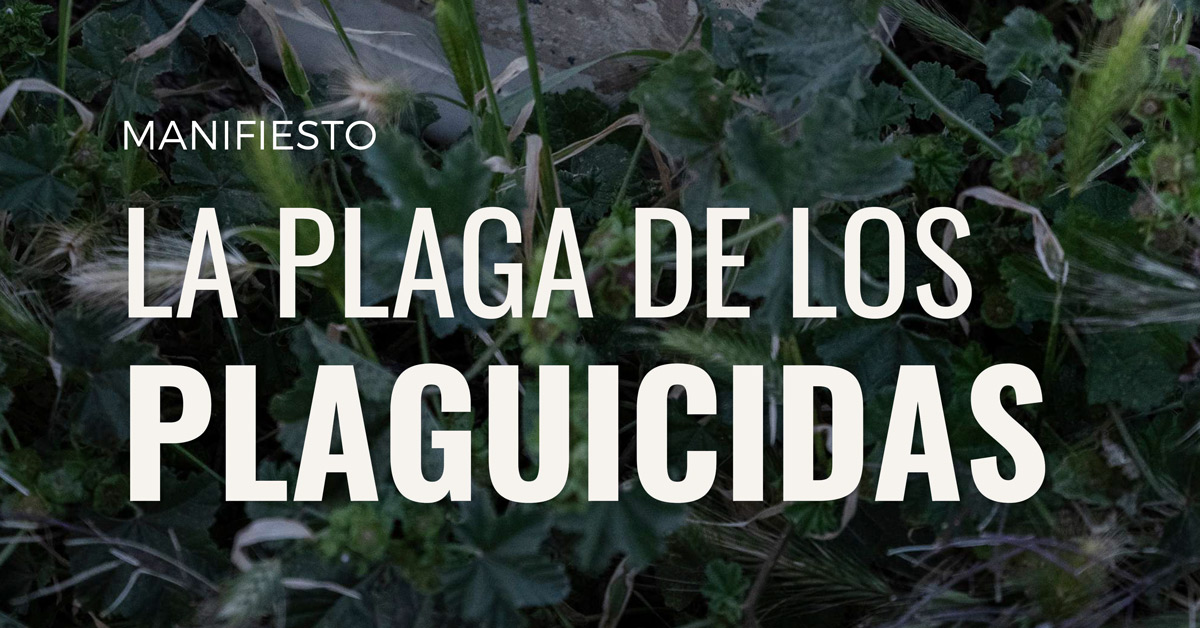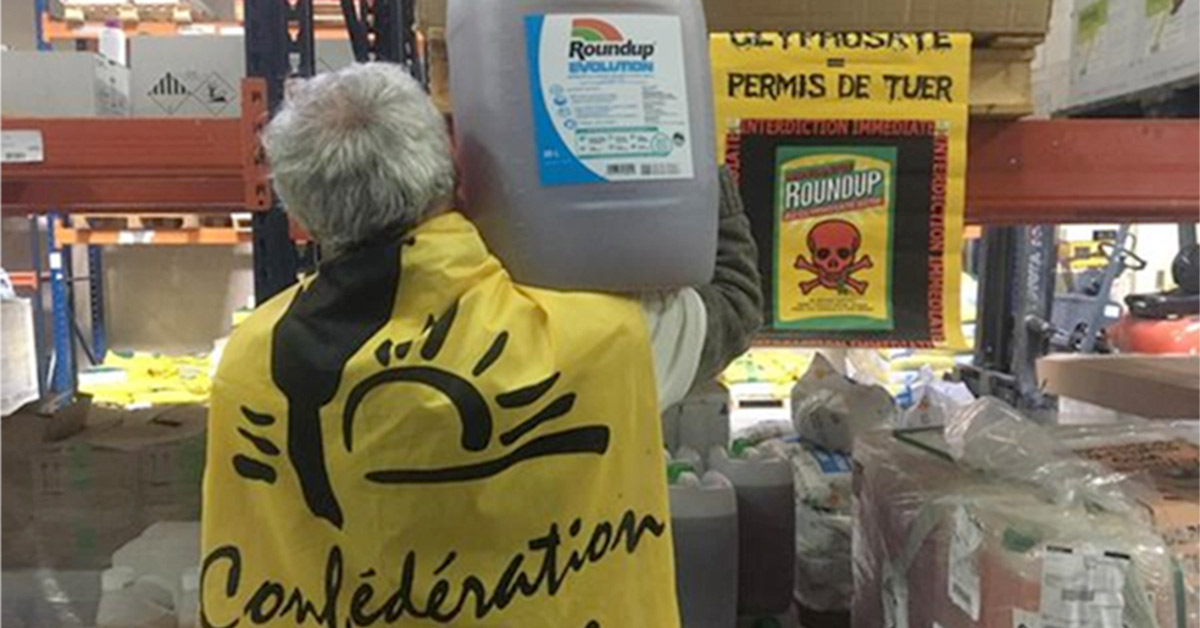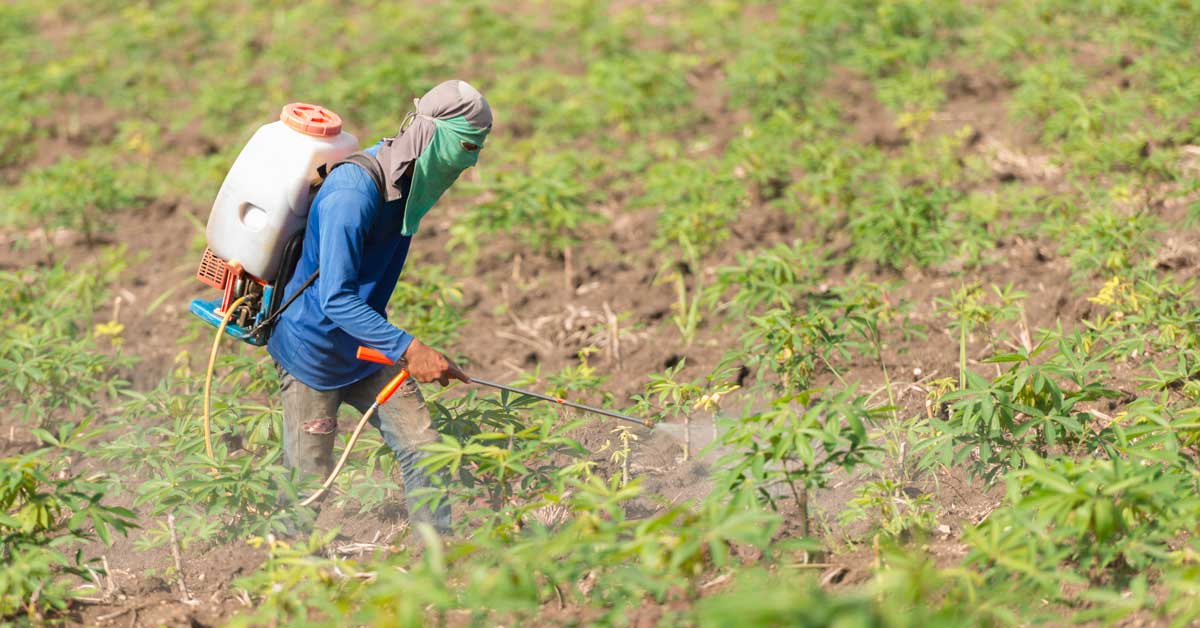Welcome to Review 559, which covers news on the GMO-related herbicide glyphosate. This Thursday, European Ministers will come together to vote on the future of glyphosate, a toxic chemical that has been protected till now by massive lobbying, regulatory failure and political cowardice. Here you will find sections on:
- ▪️ the latest research, showing glyphosate’s links to child cancer deaths, kidney disease, neurobehavioral damage, birth defects, and more
- ▪️ the scientists speaking out against renewal, including soil ecologists, specialists in neurodegenerative disease, ecotoxicologists, social scientists, and the European Network of Scientists for Social and Environmental Responsibility
- ▪️ anti-glyphosate protests in Europe, including the occupation of a pesticide storage warehouse
- ▪️ legal developments, including all the Roundup-cancer trials Bayer-Monsanto has been losing, and
- ▪️ why Bayer may be broken up because of its disastrous Monsanto acquisition.
RENEWAL IN EUROPE?
10 more years of glyphosate?
Corporate Europe Observatory’s João Camargo explains in an excellent short video how this week a committee will vote on a proposal by the European Commission to reauthorise the use of glyphosate in the European Union for 10 more years.
- ▪️ Only 1 in 7 Europeans are in favour of extending the use of glyphosate.
- ▪️ Over 2.5 million have signed a petition calling on the EU to stop this reauthorisation.
- ▪️ On Thursday 16 November, the new vote will take place.
Bayer is looking to get its desired marriage between GMOs engineered to go with glyphosate and the growing need that will create for the herbicide. This will allow them to have a massive chokehold on Europe’s farmers and food systems. Will European countries let them get away with it? In the Standing Committee last month reauthorisation failed to get a qualified majority, with Croatia, Austria, and Luxembourg voting against, and the Netherlands, Belgium, France, Germany, Bulgaria, and Malta abstaining. This week in the vote in the Appeal Committee a simple majority will be enough to condemn Europe to 10 more years of glyphosate. A decision on reauthorisation needs to be taken by 14 December 2023 at the latest, as the current approval expires on 15 December 2023.
Stop Glyphosate: Video
Ahead of this week’s vote on glyphosate renewal, PAN Europe has produced a succinct video summary of why 2.5 million Europeans and many scientists have asked for a ban. The independent science is clear: Glyphosate harms health and biodiversity. And alternatives are available.
TAKE ACTION: Time to ban glyphosate!
European Ministers will come together to vote on the future of glyphosate on Thursday. It’s our last chance to convince them to ban the toxic pesticide that not only kills bees but is linked to cancer and Parkinson’s disease. France is a key country that voted against glyphosate renewal in 2017 but has only abstained so far this time around. WeMove Europe wants as many people as possible to send a message to key French Ministers asking them to get glyphosate banned for good:
- ▪️ Send an email to key French ministers now
- ▪️ Tweet at French ministers
- ▪️ Leave a comment on their Instagram profile
- ▪️ Sign the petition to all EU ministers
Protesters in France and Spain call for a ban on glyphosate
At the end of last week protesters from the small farmers trade union the Confédération Paysanne of Brittany and Maine et Loire and a dozen other civil society groups came together in Angers – a city in western France – to say “NO!” to the reauthorization of glyphosate. A similar protest took place in the French city of Dijon under the slogan “Glyphosate, France must say no!” Meanwhile, representatives of 150 Spanish organizations from the agricultural, scientific, consumer and environmental sectors presented a petition to the Spanish government calling on them to reject glyphosate’s renewal and tackle The Plague of Pesticides.
Roundup warehouse seized by protesters
Around 60 activists (Faucheurs Volontaires d’OGM – Voluntary Reapers of GMOs), linked to the Confédération Paysanne (see item above), occupied a pesticide storage warehouse – in Carcassonne, a city in southern France – that held glyphosate-based herbicides like Roundup. Their occupation was protesting against the French government’s failure to oppose glyphosate’s reauthorisation or enforce the glyphosate ban President Macron had previously promised. It was broken up late afternoon by the police, who eventually dislodged the protesters. Seven protesters were taken into custody, which led to the other Voluntary Reapers continuing their protest outside the Carcassonne police station.
LEGAL DEVELOPMENTS
Bayer loses series of Roundup cancer trials
After losing a series of early Roundup-cancer trials, Bayer spent 10.9 billion dollars in 2020 settling many of the lawsuits against it but contested any it felt it was likely to win. That gave Bayer a series of nine court victories. But now it has started losing the trials it expected to win, as well. The first to go against it came when a jury in Monsanto’s home town of St Louis, Missouri, awarded $1.25 million in compensatory damages to a man suing the company over his cancer. His lawyer said the trial was the first in which jurors heard evidence that other chemicals in Roundup besides its main ingredient, glyphosate, could cause cancer. Then only a week later, a Philadelphia jury awarded a retired restaurant owner $175 million – $25 million in compensatory damages and $150 million in punitive. A few days after that it was the turn of a California jury to find Bayer liable for another man’s cancer. They ordered Bayer to pay $332 million in damages – $7 million in compensatory damages and $325 million in punitive. Bayer still faces close to 40,000 other Roundup-related cases.
“Glyphosate’s days are numbered” – US attorney
Commenting on the news that a San Diego jury ordered Bayer to pay $332 million in a Roundup cancer case, attorney Brent Wisner, who led the case that secured a $2 billion award against Monsanto in 2019, hailed the verdict. “Glyphosate’s days are numbered. With two more outstanding jury verdicts in the last few days and the (European Union’s) failure to decide on extending the use of glyphosate for another 10 years, the writing is on the wall,” Wisner said.
Appeals court blocks California cancer warning requirement for glyphosate
A divided federal appeals court on November 7 upheld an injunction barring California from requiring businesses to warn consumers that glyphosate, the active ingredient in Roundup, causes cancer. In a 2-1 decision, the 9th US Circuit Court of Appeals said it was unconstitutional for California to require Bayer’s Monsanto unit, which makes Roundup, and other producers of glyphosate-based herbicides, to provide the warning under a state law known as Proposition 65. The majority decision argued that this interfered with the businesses’ first amendment (free speech) rights, by compelling them to issue a warning on a controversial issue.
Battle brewing over proposed US laws to protect pesticide companies
While cancer patients are celebrating a string of courtroom victories over Bayer, proposed federal legislation backed by Bayer, CropLife America and Big Ag organisations could limit similar cases from ever going to trial in the future. Dubbed the Agricultural Labeling Uniformity Act (HR 4288), the proposed measure would provide sweeping protections for pesticide companies and their products, pre-empting local governments from implementing restrictions on pesticide use and blocking many of the legal claims that have been plaguing Bayer, according to the American Association for Justice (AAJ) and other critics. The environmental lawyer Robert F. Kennedy Jr, who was involved early in the Roundup-cancer litigation, has an excellent commentary in Newsweek on what he calls “a blatant industry strong-arm move”.
BREAK UP BAYER?
Bayer’s CEO may break up the firm because of its poor performance
Bayer’s new chief executive has blasted the company’s performance as “not acceptable”, underlining the group’s struggle to revive its fortunes after the ill-fated acquisition of Monsanto. Bill Anderson’s comment came after reporting a massive third-quarter net loss of nearly $4.9 billion. This was due to ongoing problems in its agrochemicals division, involving falling sales and prices of its key glyphosate-based herbicides. As a result, Anderson is exploring splitting off its agriculture-related business or its consumer health division in an effort to appease disgruntled investors. The company, which Anderson says has “zero cash flow”, is also planning “a significant reduction in the workforce”. Bayer’s $63 billion take-over of Monsanto saddled it with huge debts and a vast legal battle over Monsanto’s Roundup. It also halved Bayer’s stock price, which shed another 20% in the past 12 months.
Big Bayer investor calls for rethink after $332 million glyphosate defeat
Union Investment, one of Bayer’s 10 largest shareholders, says Bayer should reconsider its litigation strategy for glyphosate after it lost three Roundup-cancer trials in a row. The company has set aside a further $5 billion dollars, on top of the nearly 11 billion it has already paid out, to settle the outstanding cases. But Union Investment fund manager Markus Manns said the problem was that Bayer was trying to avoid an expensive settlement because of its difficult cash situation and its high levels of debt. Bayer’s finance chief recently said that his firm had “no appetite to write humongous checks,” but in Manns’ view, “Bayer should review its strategy again now to avoid further negative headlines”.
LATEST RESEARCH
Global Glyphosate Study reveals glyphosate-based herbicides cause leukemia in early life
A multi-institutional international toxicological study carried out at the Ramazzini Institute in Italy has found that low doses of glyphosate-based herbicides cause leukemia in rats. Importantly, half of the leukemia deaths identified in the study groups occurred at an early age. The first carcinogenicity data from the Global Glyphosate Study were presented at the international scientific conference, “Environment, Work and Health in the 21st Century: Strategies and Solutions to a Global Crisis”, in Bologna, Italy. In this long-term study, glyphosate alone and two commercial formulations, Roundup BioFlow (MON 52276) used in the EU and Ranger Pro (EPA 524-517) used in the US, were administered to rats via drinking water beginning in prenatal life, at doses of 0.5, 5, and 50 mg/kg bodyweight/day. These doses are currently (and wrongly) considered safe by regulatory agencies.
Child cancer deaths in Brazil: Is glyphosate-tolerant GMO soy farming to blame?
A new study links the pesticides used in GMO glyphosate-tolerant soy cultivation to child cancer deaths in Brazil, the world’s largest producer of soybeans. The researchers found a higher incidence of deaths from acute lymphoblastic leukemia, the most common childhood blood-borne cancer, in areas downstream of soy farms than in areas upstream. This means it is likely that the disease is linked to the pollution of drinking water. While epidemiological studies such as this cannot prove a causal link, controlled animal feeding studies can. With extraordinary timing, the new study comes hard on the heels of the finding in just such an animal feeding study by the Ramazzini Institute (see item above) that low doses of glyphosate-based herbicides, at levels deemed safe to ingest by EU regulators, cause leukemia in rats at an early age.
Vineyard pesticides causing leukemia in children, new research shows
A new study by researchers at Inserm – France’s National Institute of Health and Medical Research – has shown that the risk of pediatric leukemia for children living near vineyards increases as the density of nearby vines increases. French campaigners blame glyphosate and two fungicides used on vines for damaging human health. 11% of the glyphosate used in French agriculture is sprayed on vines.
New study: Glyphosate connected to epidemic levels of chronic kidney disease
For the past couple of decades, tens of thousands of people living in rural Sri Lanka have been devastated by chronic kidney disease of uncertain cause (also known as CKDu). Now a massive field study of the wells supplying drinking water to the Sri Lankan communities, conducted by researchers at Duke University, has identified a possible culprit – glyphosate. Although glyphosate is supposed to break down relatively quickly in the environment, it seems that when it encounters certain trace metal ions that make water hard – like magnesium and calcium – glyphosate-metal ion complexes can form. These complexes can persist up to seven years in water and 22 years in soil. Glyphosate’s fate profile resembles that of PFAS – the forever chemical, says the environmental chemist Lee Ferguson. “We think of PFAS as being a drinking water contaminant because it’s mobile and persistent. Now we’re realizing glyphosate may also be quite persistent in hard water areas. This gives me concerns about exposures here in the US.”
Young brains at risk from exposure to glyphosate and 2,4-D
A new study looking at glyphosate and 2,4-D found that the two widely used weed killers could be harming the brain function of young people, impacting their memory and learning abilities. Glyphosate was detected in the urine of 98.3% of the study participants and 2,4-D was found in 66.2%. Glyphosate was associated with problems with social perception, while 2,4-D was associated with attention/inhibition, language and memory/learning skills. Prior research in mice also shows glyphosate exposure is linked to a range of neurobehavioral changes.
Link between glyphosate and birth defects officially recognised in France
Théo Grataloup, who suffered serious malformations after prenatal exposure to glyphosate, is entitled to compensation after an officially appointed committee of independent experts attributed his birth defects to glyphosate. Now 16, Théo has undergone 54 operations under general anesthesia – the majority to reconstruct his digestive and respiratory systems. The first six years of his life, his mother says, were devoted to “Fighting every day to breathe, to eat, to speak”. He still relies on a tracheotomy to breathe.
Early warnings of birth defects from glyphosate exposure
Back in 2012, GMWatch’s Claire Robinson, along with Prof Michael Antoniou and other eminent scientists, were among the first to draw attention to the ability of glyphosate (even without the co-formulants present in the commercial formulations) to cause birth defects, as revealed in the pesticide industry’s own studies. Their paper built on the research of the late Prof Andres Carrasco, published in 2010, which found that glyphosate-based herbicides caused birth defects in chicken and frog embryos. Carrasco and colleagues noted that the types of birth defects found in the animal embryos were the same as the defects observed in escalating numbers in the children of rural communities in Argentina, where glyphosate herbicides are sprayed on GM glyphosate-tolerant soy.
REGULATORY FAILURE: SCIENTISTS SPEAK OUT
Scientists call on minister to say no to glyphosate renewal
159 scientists from universities and institutes across the Netherlands have made a last-ditch appeal to farm minister Piet Adema to vote against EU plans to re-licence glyphosate for a further 10 years. The scientists argue that it is impossible to say if glyphosate is safe given the current assessment system used in Europe. A majority of Dutch MPs have also called on the minister to vote no, rather than abstain. The scientists include neurologist and Parkinson’s expert Bas Bloem, toxicologist Martina Vijver, and pesticide researcher Daniel Figueiredo. In the letter, they say the European Food Safety Authority (EFSA) has not taken all the relevant research into account when recommending the licence extension.
17 French soil ecologists want glyphosate banned due to harmful effects on worms
17 French soil ecologists say European agencies responsible for risk assessing glyphosate failed to take into account numerous scientific studies on its impact on earthworms, many highlighting negative effects. They say there’s enough evidence to ban it. They say the European Food Safety Authority (EFSA) only looked at two studies on the crucial issue of the impact of glyphosate on earthworms. And these were ultimately not considered in EFSA's report. Moreover, industry’s mandatory tests are carried out on compost worms – known to be up to four times less sensitive to pesticides than earthworms. The scientists say that while unrealistic industry studies show no harm, numerous more realistic independent studies show glyphosate has damaging effects on the DNA, growth, reproduction and behaviour of worms, especially earthworms – effects that can occur after a single glyphosate application at the recommended dose.
Experts warn that glyphosate’s link to neurodegenerative diseases is not being properly assessed
Scientists specialising in neurodegenerative diseases write in Le Monde that there is now a body of scientific evidence indicating glyphosate is a possible cause of Parkinson’s — and a consensus that the current regulatory framework for evaluating the risk is seriously inadequate. Animal studies show areas of the brain affected by Parkinson’s are damaged by glyphosate exposure. A recent study showed glyphosate exposure is associated with signs of brain damage found in Parkinson’s and Alzheimer’s. These effects were observed in the general human population. Current animal testing for the impact of glyphosate exposure on the brain is ineffective. The brain's large reserve capacity means 40% of brain cells could be dead and the animal tested would still appear perfectly healthy, even though the pesticide studied is anything but safe. Targeted cell counts in brain regions implicated in Parkinson's disease are needed, but this is currently not part of the evaluation. The scientists (Bas Bloem, professor of neurology, and Tjitske Boonstra, researcher in neurology), who have also written about the inadequacy of current pesticide regulations for protecting brain health in the latest issue of The Lancet, are advising governments to:
- ▪️ Vote against re-authorising glyphosate
- ▪️ Fund the rapid development of an improved pesticide assessment framework
- ▪️ Avoid leaving testing to industry — use independent scientists.
EFSA is blocking effective research into neurotoxicity
EFSA’s management has rejected solutions that would better assess the links between Parkinson’s disease and neurotoxic pesticides, like glyphosate, in what Pesticide Action Network Europe is calling “a scandal of major proportions”. Although international experts agree that current pesticide evaluation is inadequate, and EFSA promised to respond to their concerns, it has failed to develop new testing guidelines reflecting the available scientific knowledge.
Glyphosate increasingly contaminating groundwater but EFSA’s models fail to show this. “Scientifically unacceptable,” say researchers
EFSA cannot legally grant approval to glyphosate unless its use doesn’t “result in groundwater concentrations above the drinking water standard”. Ecotoxicologist Peter Leendertse has found 208 cases of glyphosate contamination in Dutch groundwater data. In almost half of those cases the contamination exceeded the legal drinking water standard. But EFSA continues to deny the problem, dismissing all such measurements showing that level of contamination as outliers, or as possible mis-measurements or temporary glitches due to the misapplication of the herbicide. Leendertse says the contamination is increasing and is particularly serious because almost 60% of Dutch drinking water comes from groundwater – in the rest of Europe it’s more like 75%, and groundwater contamination is difficult to reverse. He says it’s high time alarm bells started ringing among policymakers.
Glyphosate: EU pesticide approval system fails to identify full impact – scientists
The European Network of Scientists for Social and Environmental Responsibility (ENSSER) says it has “serious reservations” about the position of “no critical areas of concern” adopted by the European Food Safety Authority (EFSA) on the herbicide active ingredient glyphosate and about the European Commission’s subsequent proposal to renew its market approval. In its statement ENSSER writes, “We note that the European Chemicals Agency (ECHA) and subsequently EFSA have neglected to consider extensive, damning scientific evidence from laboratory studies, which demonstrate that glyphosate and its commercial formulations can give rise to toxicity and serious diseases through different mechanisms of action. This includes induction of fatty liver disease, oxidative stress, DNA damage, neurological damage and cancer.” The scientists say that based on the precautionary principle, glyphosate should not be re-approved in the EU.
Glyphosate renewal not driven by real science but “regulatory science” based on confidential industry data
In an interview, the French sociologist Prof Sylvain Laurens says glyphosate is an example of how EU regulators are not engaging in science but “regulatory science” at best. Scientists do not have access to the data sets of all the studies provided by industry (partly protected by industrial secrecy). And even when Bayer announces that it will provide full transparency to the publications it has selected or funded, we do not have access to the raw data sets, only at best to the abstracts. That means we are dealing with science that is not just hampered in its principles of free communication of data but where we cannot ensure these studies can be replicated. This is a distortion of what science really is. Between this “regulatory science” and science in general, there is therefore a gap, a gap that glyphosate’s manufacturers are happy to occupy. But Prof Laurens says glyphosate is up for renewal, despite all the concerns about it, not just because of how “regulatory science” is skewed by industry but also because governments currently have no glyphosate exit strategy for farmers. The status quo continues because nothing has been done to support change in the sector. Prof Lauren sees a parallel with asbestos where governments largely ignored health warnings for many years because they saw asbestos as an affordable, widely available, and effective material that the building industry had come to rely on.
EPA refuses to examine toxicity of “inert” pesticide chemicals
Ingredients labelled in the US as “inactive” or “inert” in commercial pesticide formulas are poisoning human and animal consumers and the environment, but the US Environmental Protection Agency (EPA) has rebuffed calls to examine their toxicity and risks, reports The Guardian. Agency rules do not require the EPA to account for supposedly “inactive” ingredients when it evaluates pesticide formula safety, despite the fact that industry labels dangerous substances like PFAS as inert. A 2017 Center for Food Safety (CFS) legal petition asked the EPA to close the loophole, but the agency has just denied the request. In its response, the EPA claimed too many pesticide formulas exist for the agency to check them all for safety. Bill Freese, director at CFS, said, “The idea that we’re not assessing the actual chemicals that farmers spray is kind of ridiculous.” And Prof Michael Antoniou, who has conducted research for many years on glyphosate and its commercial formulations, such as Roundup, says regulators also need “to investigate the presence of the co-formulants in food to see what’s there”. He says that to fail to look into this and the other questions around co-formulant toxicity “is negligence on the part of governments and their regulatory agencies and clearly puts public health and the environment at great risk”.
Feds not protecting Canadians from “undeniable” pesticide danger
Calls for Canada’s federal government to overhaul its pesticide laws and regulatory agencies are being made in the wake of revelations that Canada’s Pest Management Regulatory Agency (PMRA) failed to warn Canadians about the health dangers of a pesticide used on sports fields, golf courses and vegetable farms. The pesticide — dimethyl tetrachloroterephthalate, or DCPA — can cause “serious, permanent and irreversible” damage to fetuses without the mother showing any symptoms, according to the US Environmental Protection Agency (EPA). It is the second time this year the agency has come under fire for failing to warn Canadians about a pesticide on the cusp of being banned and measures taken to limit its use. This spring, an investigation found the PMRA ignored warnings from its own scientists about the toxic pesticide chlorpyrifos.
..................................................................
We hope you’ve enjoyed this newsletter, which is made possible by readers’ donations. Please support our work with a one-off or regular donation. Thank you!




